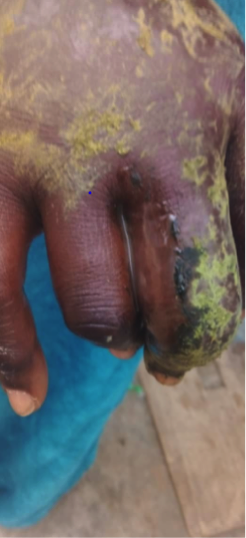A second-hand clothes hawker, Vida Maison has had her hand rotten following her inability to pay her medical bills because the Ashaiman Municipal Assembly (ASHMA) Task Force has confiscated her items.
According to Maison, the secondhand clothes business has been the only means of survival for her and her children.
However, the only means of sustenance came to an end when the ASHMA Task Force seized her ‘goods’ in late November 2021 because she violated the Municipal Assembly bye-law that regulates movement and petty trading.
The CCF team intervened for Maison because of her vulnerability. She told the team, ‘I could hardly feed my family as I earn very little profit, I do not have a health insurance cover and I face constant harassment from the Municipal Assembly Task Force because I cannot afford a market stall for my business.’
After the intervention, the Task Force educated Vida on why she is not supposed to sell at places unauthorized for hawking.
Unfortunately, though the Taskforce agreed to release the goods to her, they could not immediately trace them before the CCF team left the Municipality.
Later, Maison reported that the Task Force could not find her goods, making her lose her capital.
Days after the incident, Maison said she fell sick, with her hand swollen.

She said she could not raise money to get the needed medical treatment as she endures the unbearable pain induced by the sickness. Feeding her children has also become a struggle for her.
“The pain is unbearable to the extent that I even have to cry. I cannot even afford to feed my children and they are starving,” she said.
CCF is pleading with the Metropolitan, Municipal, and District Assemblies (MMDAs) to add a human face to their work in fulfilling their mandate to make the cities better places. This is because, for most of the victims, their economic, education, and rights to health care are affected when their businesses are ‘destroyed’.
The visit by CCF to Ashaiman formed part of the implementation of the organization’s “Decriminalizing Vagrancy Laws and Advocacy” project in 12 MMDAs in Greater Accra, Central and Ashanti Regions. The main aim of the project is to create an enabling environment for the homeless/vagrants to know, claim and exercise their rights to end the criminalization of homeless persons and other categories of people affected by vagrancy laws in Ghana.
About OSIWA:
Established in 2000, the Open Society Initiative for West Africa (OSIWA) is a grant-making and advocacy organization focused on equality, justice, democratic governance, human rights, and knowledge generation. It is part of the global network of Open Society Foundations spread across 37 countries around the world.
Cosmos Akorli

















































